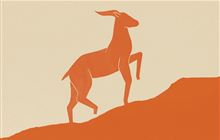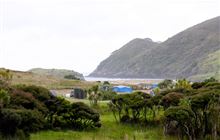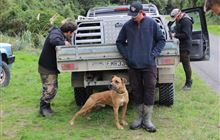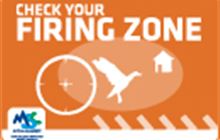Competition rules
Introduction
Read the competition rules for the National Wild Goat Hunting Competition.Competition rules
- The competition is open to all hunters.
- All goat tails and goat heads entered must be wild and taken legally, recreationally and humanely within 1 August to 26 November. If using firearms hunters must have a current firearms license or be supervised by a current and appropriate firearms license holder. Hunters must comply with sections 30A and 30B of the Animal Welfare Act 1999.
- The competition may occur anywhere you have permission to hunt either through landowner consent or the local authority of the land, by permit for public conservation land, forestry, farms or regional council land.
- All land access conditions must be followed, whether under permit or through landowner consent.
- Wild goat heads can only be taken to an approved New Zealand Deerstalker Association entry point.
- All wild goat tails and heads must be presented fresh or frozen in a clean manner. Tails need to be secured in a bag and if frozen, tails need to be in a free flow state, so they can be easily counted.
- All wild goat tails will be counted by an approved verifier.
- All wild goat tails and goat heads entered at an official recording point will be eligible for the national prize draw. Noting all tails and heads are only eligible to be entered once in the competition.
- In the event that a wild goat is killed, but cannot be retrieved by a competitor, the competitor may take a time and date stamped photo with the dead wild goat in view to an official recording point for review. It is at the Judge’s discretion whether to accept the photo as proof of a tail entry.
- All wild goat head measurements will be based on the Douglas Scoring System and will be carried out by an approved New Zealand Deerstalker Association judge. Judge’s decision is final.
- Any goat tail and/or head taken in a paid or commercial capacity is not eligible as an entry into the national or any local competition.
- No responsibility can be accepted for any entries lost, delayed, or corrupted as a result of computer error.
- The organisers reserve the right to refuse any wild goat tail or head, should they doubt its eligibility. Honesty that the wild goat tail or head are taken in accordance with all the competition rules is appreciated.
- By entering into the competition, you agree to the collection and use of any personal information and data supplied for the purposes of contacting and publicly announcing prizewinners, and to measure the success of the competition.
Hunters must practice safe hunting
All competitors must:
- follow the 7 rules of firearms safety
- follow the New Zealand Deerstalkers Association Code of Ethics
- follow the Outdoor Access Code
- follow the Firearms Safety Code.
Read more about how to keep safe while hunting.
Hunters must practice ethical and humane hunting
Reducing wild goat numbers is important to protect New Zealand’s farmlands and native plants. All wild goats must be taken legally and humanely. It is an offence under the Animal Welfare Act 1999 to wilfully or recklessly ill-treat a wild animal or an animal in a wild state.
- Methods of hunting will be generally accepted practices. These include shooting with firearms or with archery equipment.
- Hunters must ensure their firearms or archery equipment are of sufficient power and accuracy for the purpose of humanely dispatching wild goats and that their own knowledge, competence, and proficiency ensures this.
- Only shoot if a humane kill (rapid insensibility) is judged as highly probable.
- If any goat may have been wounded but not quickly killed by a shooting attempt the hunter must promptly make a thorough effort to locate and humanely dispatch it. Thorough effort must be made to locate and humanely kill any dependent young goat if the parent has been killed.
- Any use of dogs as an aid to hunting must also comply with the Animal Welfare Act. It is understood that dogs may be used to indicate the presence/location of goats and/or bail goats, but will not physically restrain (hold) or maul them.
- If hunting on private land, hunters will need to talk to the landowner or manager about dog use. Any restrictions around hunting dogs should be followed.
Know the area you are hunting in
- Be aware of the boundaries of hunting areas – livestock may be present.
- Be visible, take appropriate equipment, check the weather, and let someone know where you are going.
- Be careful in steep terrain or flooded waterways, if in doubt do not retrieve the goat and take a picture instead.
- Identify your target beyond doubt, and make sure your shooting background is safe (not towards skylines).
- Don’t take any risks with steep terrain or flooded waterways to retrieve goat tails.
Be conscious of areas affected by Cyclone Gabrielle and other recent storm events. Many things may impact on hunting wild goats including loss of access due to roads, bridges, and tracks being damaged or destroyed.
There is a high change of coming across more natural hazards such as debris in waterways, landslides, and rockfalls. It is likely that some landowners may not be able to grant the usual hunter access due to damage their properties have incurred.
Hunters must have landowner permission and applicable permits for every visit
The competition offers a way to build win-win relationships with your local landowners.
Make sure you have permission to enter, and you have a clear understanding when and where you will be hunting with the landowner or land manager. Ask if it is necessary to notify neighbouring properties so they are not concerned if they hear rifle shots or see hunters.
Follow the guidelines on Herenga ā Nuku Aotearoa's Crossing private land webpage when asking for permission to hunt on private land.
Clean up animal waste
Be considerate of others when hunting and ensure you leave the area in a tidy state. This includes managing animal waste. On public conservation land, carcasses or other animal waste is not to be left near tracks, campsites, huts and waterways. For more guidance on this, follow DOC’s hunting safety guidelines.
If hunting on land that is not public conservation land, talk with the land manager about what to do with any carcasses before going out on your hunt.
It is not appropriate to dump carcasses in public places.
Prize disclaimer
- Each winner will be notified by email, phone (voice or text), and must be available for the preparation of all publicity that may be required by the organiser. Where attempts to contact the winner fail (e.g. when the winner cannot be contacted by phone or email after three attempts) the organiser will select another winner. If, after successful notification, the prize is not collected within two months of being announced it will be regarded as forfeit.
- Each entry will be checked by the organiser to ensure an approved entry verifier has submitted it.
- The organiser’s determination of the winners will be final and no correspondence will be entered into.
Contact
For more information email Megan Robinson: wildanimalmanagement@doc.govt.nz.




